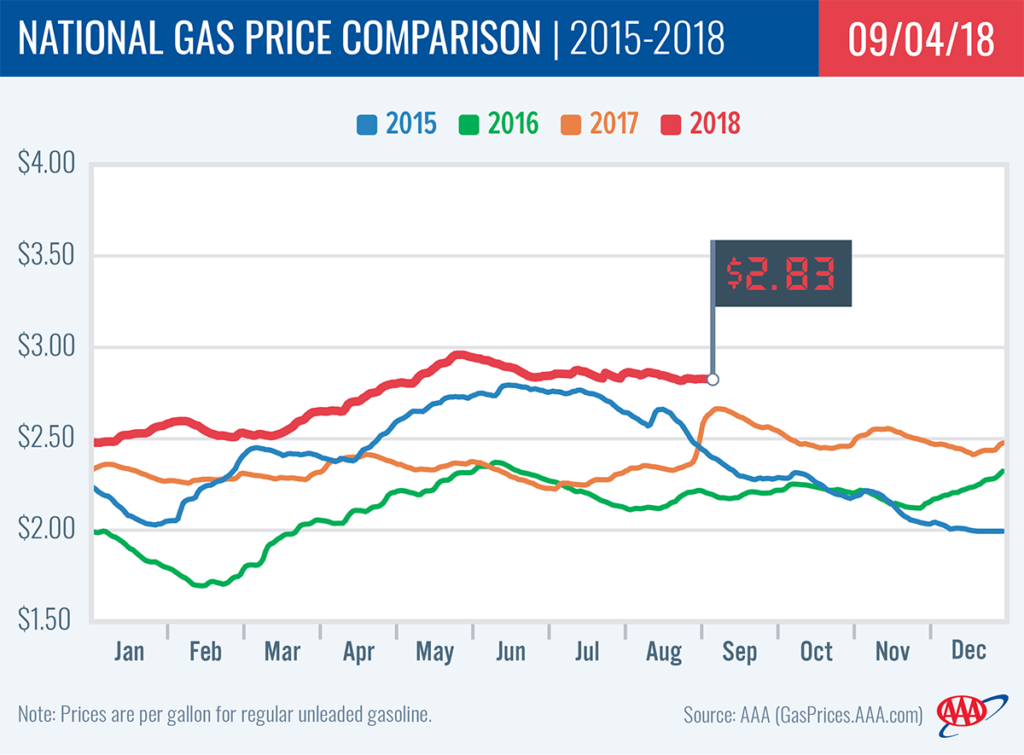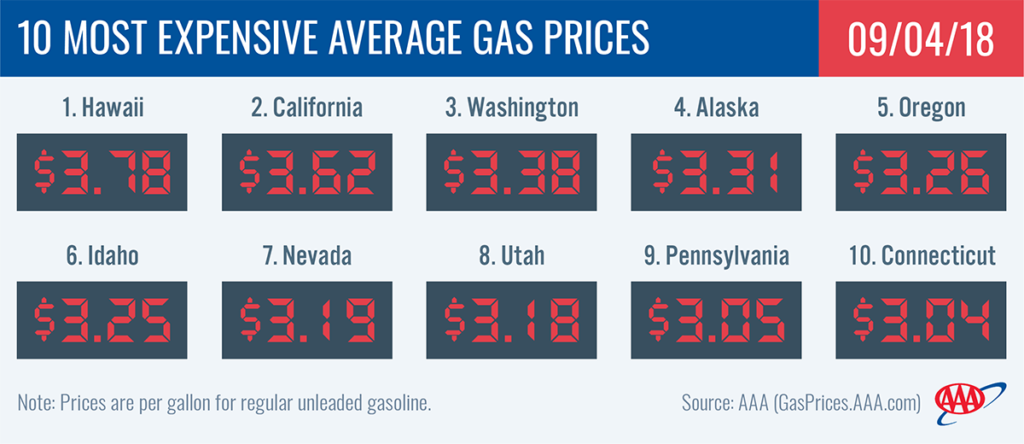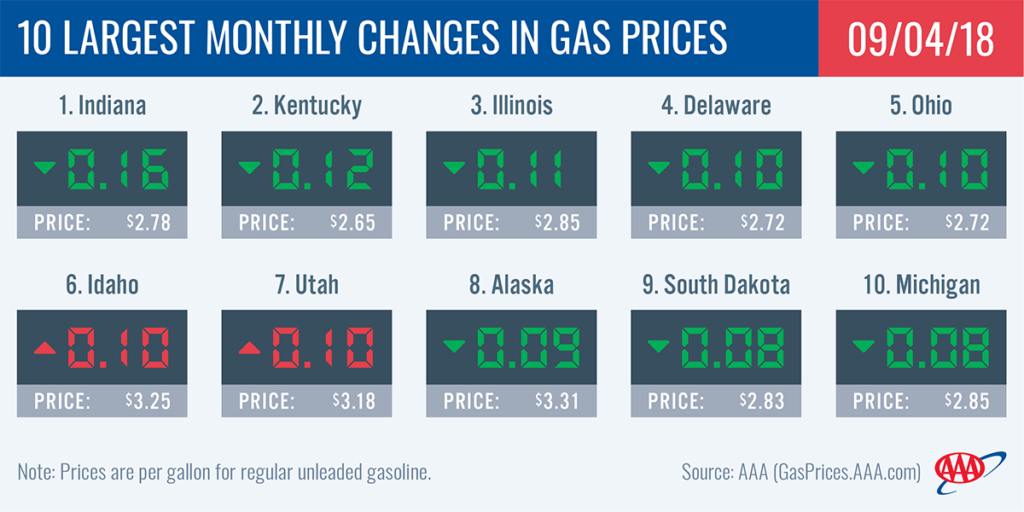At $2.83, the national gas price average is trending toward lower gas prices that motorists haven’t seen since early May. Today’s national gas price average is one-cent less on the week, four-cents cheaper than last month, but 19-cents more than a year ago.
Motorists took advantage of these stable and lower prices by driving gasoline demand to its highest level ever on record at 9.899 bbl for the week ending August 24, according to the Energy Information Administration. But that spike is not expected to continue.
“With summer in the rearview mirror, demand is expected to significantly drop off in the coming weeks which means motorists can expect to see gas prices steadily decline,” said Jeanette Casselano, AAA spokesperson. “AAA expects the national average to hit $2.70 or less this fall.”
Quick Stats
- The nation’s top 10 most expensive markets are: Hawaii($3.78), California ($3.62), Washington ($3.38), Alaska ($3.31), Oregon ($3.26), Idaho ($3.25), Nevada ($3.19), Utah ($3.18), Pennsylvania ($3.05), and Connecticut ($3.04).
- The nation’s top 10 largest monthly changes are: Indiana (-16 cents), Kentucky (-12 cents), Illinois (-11 cents), Delaware (-10 cents), Ohio (-10 cents), Idaho (+10 cents), Utah (+10 cents), Alaska (-9 cents), South Dakota (-8 cents) and Michigan (-8 cents).
West Coast
The West Coast remains the nation’s most expensive region for retail gasoline, and most of the states represented in the nation’s top ten most expensive are located west of the Rockies. Hawaii ($3.78) is the nation’s most expensive market, followed by California ($3.62), Washington ($3.38), Alaska ($3.31), Oregon ($3.26), Nevada ($3.19) and Arizona ($2.86). Prices in the region are mostly flat compared to last week, except for a two-cent jump in both California and Oregon.
Last week’s, Energy Information Administration report showed West Coast gasoline supplies dropped by 1.2million bbl, their largest one-week draw in five months. The region’s supplies now sit at 28.9 million bbl, which is still 2.7 million bbl higher than the same week last year.
Great Lakes and Central
Gas prices continue to be volatile in the Great Lakes and Central states with gas price averages as much as seven-cents cheaper in Michigan to six-cents more expensive in Missouri on the week. While some states in the region saw slight increases at the pump due to the holiday weekend, most states are seeing cheaper pump prices, which will likely be the trend for the region in coming weeks as gasoline demand is expected to level off.
Despite a draw in inventory, regional levels remain at a healthy nearly 53 million bbl – which is helping to keep most gas prices down. The EIA reports that total levels are on par with this time last year.
South and Southeast
Gas price averages are on a roller coaster ride in the South and Southeast. On the week, gas prices are up, down and stable throughout the region: Florida (+6 cents), Texas (-2 cent), Louisiana (-1 cent). Pump prices held fairly steady in Georgia ($2.70), Alabama ($2.53), South Carolina ($2.53), Arkansas ($2.57) and Mississippi ($2.55).
Some of the volatility is likely due the region’s drop in demand as seen in the year-over-year 1.5 million bbl deficit in gasoline inventories. Despite the deficit, the EIA reports total inventory for the South and Southeast at 80.9 million bbl, which is one of the largest readings in the region for July and August 2018 data.
Residents and businesses are bracing for tropical storm Gordon, which is forecast to make landfall late Tuesday as a Category 1 hurricane along the coast of Louisiana and Mississippi. The National Hurricane Center warned of storm surges and possible tornadoes in Louisiana, Mississippi, Alabama and the Florida Panhandle. AAA will continue to monitor the storm and will provide updates and information that may impact gas prices.
Mid-Atlantic and Northeast
Gas prices continue to trend flat across the Mid-Atlantic and Northeast states.
Gasoline inventories added a surprise for this time of year- landing at 837,000 bbl, according to the latest EIA data. The Mid-Atlantic and Northeast were the only regions to see an inventory build. At 64 million bbl in total, the region is sitting on a 1.5 million surplus, which is helping to keep gas prices flat and cheaper than earlier this summer.
Rockies
After weeks of steady increases, gas price averages in Utah (-2 cents), Wyoming (-1 cent) and Idaho (-1 cent) have dropped, though not by much. Conversely, prices are up on the week for motorists in Colorado (+3 cents).
The discrepancy in pump price can be attributed, in part, to declining inventory level. Totaling 5.9 million bbl, regional inventories sit at their lowest level since August 2014. The drop has contributed to the rise in prices in some states and toward small decreases in both Idaho’s ($3.25) and Utah’s ($3.18) very expensive state averages.
Oil market dynamics
At the close of Friday’s formal trading session on the NYMEX, WTI decreased 45 cents to settle at $69.80. Oil prices reflected modest gains last week, following the release of EIA’s report, which showed U.S. crude inventories fell nearly 2.6 million bbl. The U.S. also saw gasoline production increase last week, averaging 10.2 million barrels per day and refinery capacity sitting at 93.6%. Another sign of increased U.S. production came with the gain of two oil rigs bringing the U.S. total to 862 according to Baker Hughes.
International factors are also impacting global supply and demand for crude oil as Iranian oil exports drop as a result of sanctions. The market may react to tightened supply and pressure prices higher as a result of the next round of U.S. economic sanctions against Iran that are expected in November.
Market watchers will keep a close eye on the impacts of additional Iran sanctions and the storm in the Gulf of Mexico. Both factors could affect prices at the pump moving forward.
Motorists can find current gas prices along their route with the free AAA Mobile app for iPhone, iPad and Android. The app can also be used to map a route, find discounts, book a hotel and access AAA roadside assistance. Learn more at AAA.com/mobile.



